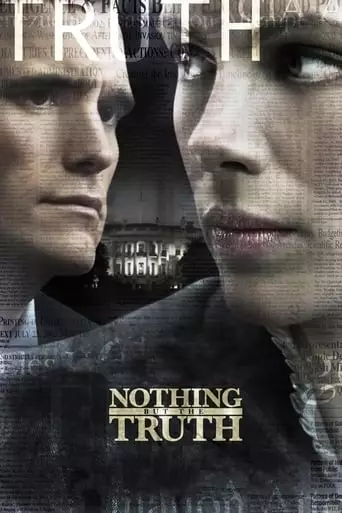When reporter Rachel Armstrong writes a story that reveals the identity of a covert CIA operative, the government demands that Rachel reveal her source. She defies the special prosecutor and is thrown in jail. Meanwhile, her attorney, Albert Burnside argues her case all the way to the U.S. Supreme Court.
Nothing But the Truth is a political thriller directed by Rod Lurie, featuring a compelling cast including Kate Beckinsale, Vera Farmiga, and Alan Alda. The film is inspired by real events and delves into the ethical and legal challenges faced by a journalist who refuses to disclose her confidential source.
The narrative follows Rachel Armstrong (Kate Beckinsale), an ambitious reporter for the Washington D.C. newspaper Capital Sun-Times. She uncovers a government cover-up involving the assassination attempt on President Lyman, which the administration falsely attributes to Venezuela. In her report, Armstrong reveals that the administration knowingly misled the public and that the CIA had evidence disproving the Venezuelan connection. The article also identifies Erica Van Doren (Vera Farmiga), a covert CIA operative, as the source.
The revelation of Van Doren’s identity leads to a federal investigation, with Special Prosecutor Patton Dubois (Matt Dillon) determined to uncover Armstrong’s source. Armstrong refuses to disclose her source, citing journalistic ethics and the protection of confidential sources. Her steadfastness results in her imprisonment for contempt of court, leading to personal and professional repercussions, including strained relationships with her family and colleagues.
The film explores the tension between national security and press freedom, highlighting the moral and legal complexities faced by individuals who prioritize truth and transparency over personal and professional consequences.
Main Themes in Nothing But the Truth
- Press Freedom and Journalistic Integrity: The film underscores the fundamental role of a free press in a democratic society. Armstrong’s unwavering commitment to protecting her source exemplifies the ethical standards that journalists uphold, even at great personal cost.
- Government Secrecy and Accountability: The narrative critiques the government’s tendency to conceal information under the guise of national security. It questions the extent to which authorities can suppress information and the implications for public trust and accountability.
- Personal Sacrifice and Moral Courage: Armstrong’s journey highlights the personal sacrifices individuals make when standing up for their principles. Her decision to protect her source, despite facing imprisonment and personal loss, exemplifies moral courage in the face of adversity.
- Legal and Ethical Boundaries: The film delves into the legal ramifications of protecting confidential sources, exploring the balance between legal obligations and ethical duties. It raises questions about the limits of legal authority in compelling individuals to disclose information.
Impact of Nothing But the Truth
Upon its release, Nothing But the Truth received critical acclaim for its compelling storytelling and strong performances. The film sparked discussions about the ethical responsibilities of journalists and the challenges they face in protecting their sources. Critics praised the film for its timely and relevant exploration of press freedom, especially in the context of real-world events involving the exposure of covert operatives. The film’s portrayal of the moral dilemmas faced by its characters resonated with audiences, prompting reflection on the balance between national security and the public’s right to know.
7 Reasons to Watch Nothing But the Truth (2008)
- Compelling Performances: Kate Beckinsale delivers a powerful portrayal of Rachel Armstrong, capturing the character’s determination and vulnerability. Vera Farmiga’s nuanced performance as Erica Van Doren adds depth to the narrative, while Alan Alda provides a strong supporting role as the principled attorney Albert Burnside.
- Timely and Relevant Storyline: The film addresses issues of press freedom and government transparency, topics that are perennially relevant. Its exploration of the ethical challenges faced by journalists in protecting confidential sources resonates with current discussions about media integrity and governmental accountability.
- Strong Direction and Screenplay: Rod Lurie’s direction ensures a taut and engaging narrative, while his screenplay delivers sharp dialogue that captures the intensity of the legal and ethical battles at the film’s core. The pacing maintains suspense, keeping viewers invested in the characters’ journeys.
- Thought-Provoking Themes: The film delves into complex themes such as the balance between national security and press freedom, the moral courage required to uphold ethical standards, and the personal sacrifices involved in standing up for one’s principles. It encourages viewers to reflect on the role of the press in a democratic society.
- High Production Quality: The film boasts high production values, with meticulous attention to detail in set design and cinematography. The realistic portrayal of the newsroom and courtroom settings enhances the authenticity of the narrative, immersing viewers in the world of investigative journalism.
- Engaging Legal Drama: As a legal drama, the film offers suspense and intrigue, with unexpected twists and turns that keep viewers on the edge of their seats. The courtroom scenes are particularly compelling, showcasing the strategic maneuvering and ethical dilemmas faced by the characters.
- Emotional Depth: The film explores the personal and emotional toll of standing up for one’s beliefs, highlighting the impact on relationships and personal well-being. It portrays the human side of the characters, making their struggles and triumphs relatable and poignant.
How Will You Feel After Watching Nothing But the Truth (2008)?
After watching Nothing But the Truth, you will likely experience a range of emotions, from admiration for the characters’ moral courage to discomfort with the ethical compromises they face. The film’s exploration of press freedom and government secrecy may prompt you to reflect on the importance of transparency and accountability in a democratic society. You might feel a sense of empowerment witnessing a strong female character navigate the challenges of investigative journalism, yet also a sense of frustration at the obstacles she encounters. The film’s portrayal of personal sacrifice and moral dilemmas may leave you contemplating the costs of standing up for one’s principles. Ultimately, Nothing But the Truth will leave you with a heightened awareness of the complexities involved in the pursuit of truth and the ethical responsibilities of both the press and the government.

